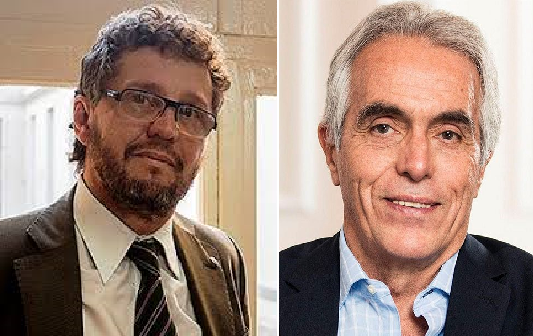Image: Fabian Salviol (left) & Diego García-Sayán (right)
Two United Nations Special Rapporteurs, namely, Special Rapporteur on the independence of judges and lawyers, and Fabian Salvioli, Special Rapporteur on the promotion of truth, justice, reparation, and guarantees of non-recurrence have sent President Rajapaksa a communication concerning the 20th Amendment to the Constitution of Sri Lanka.
The report mainly deals with the independence of the judiciary and the separation of powers, as well as on the independence of institutions which are essential to the establishment of guarantees of nonrecurrence of past gross violations of human rights and serious violations of international humanitarian law, in particular the Human Rights Commission and the National Police Commission.
This communication will be presented to the United Nations Human Rights Council.
Its recommendation fellows:
Recommendations
In a spirit of co-operation and dialogue, and in line with the mandate entrusted to me by the Human Rights Council, we would like to recommend that your Excellency’s Parliament:
1. Amend provisions regarding the composition of the Parliamentary Council, so as to ensure that this body has a pluralistic composition and includes not only politicians, but also independent experts who are not members of any political party and reflect the pluralistic character of Sri Lankan society;
2. Eliminate the wide discretionary powers attributed to the President of the Republic in the procedure for the selection, appointment and dismissal of the Chief Justice and judges of the Supreme Court, the president and judges of the Court of Appeal, members of the Judicial Service Commission and the Attorney-General, in order to mitigate the risk of political interference in the selection of candidates to senior judicial offices and high-raking positions in the administration of justice.
3. Consider broadening the composition of the Judicial Service Commission, so as to ensure that it includes not only judges, but also lay members, chosen among lawyers, law professors, jurists, Bar members, as well as citizens of acknowledged reputation and
experience.
4. Eliminate the wide discretionary powers attributed to the President of the Republic in the procedure for the selection, appointment and dismissal of members of the Judicial Service Commission, in order to mitigate the risk of political interference.
5. Introduce new modalities for the selection of the judge members of the Commission, following methods guaranteeing the widest representation of the judiciary at all levels.
6. Ensure that the review of the composition and functioning of the Parliamentary Council and the Judicial Service Commission is the result of an open, fair and transparent process, involving not only the Parliament and the Executive power, but also extensive public
consultation with judges, prosecutors, lawyers and their professional associations;
7. Adopt any other appropriate measure to ensure the protection and promotion of the independence of the judiciary and the separation of powers.
8. Eliminate the wide discretionary powers attributed to the President of the Republic in the procedure for the selection, appointment and dismissal of members and the Chairperson of independent commissions established in the Constitution, including the Human Rights Commission and the National Police Commission in order to mitigate the risk of political interference with the selection of candidates and the independence of these institutions which are a vital guarantee of non-recurrence of past serious human rights violations
and of sustainability of transitional justice processes.
9. Ensure that provisions for presidential immunity are not applicable to the prosecution and sanction of gross violations of human rights and serious violations of international humanitarian law, as established by international human rights standards.
10. Adopt any other appropriate measures to ensure the effective realization of the rights to truth, justice, reparation and guarantees of non-recurrence for gross violations of human rights and serious violations of international humanitarian law.
This communication, as a comment on pending or recently adopted legislation,
regulations or policies, and any response received from your Excellency’s Government
will be made public via the communications reporting website within 48 hours. They
will also subsequently be made available in the usual report to be presented to the
Human Rights Council.
Please accept, Excellency, the assurances of our highest consideration.
Diego García-Sayán
Special Rapporteur on the independence of judges and lawyers
Fabian Salvioli
Special Rapporteur on the promotion of truth, justice, reparation and guarantees of
non-recurrence
Read the full report as a PDF:UN SPs on 20th A 101220
